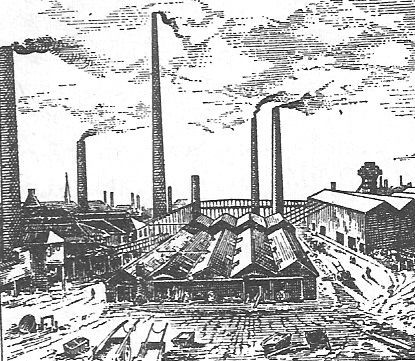Industrial Revolution, or as some would prefer, “Industrialisation,” refers to the change or progression of a country’s economy from an agrarian economy to one dominated by machines and industries. It is also used to describe the improvement in economic development and technological advancement of a country.
Industrialisation is significant for Africa’s development, as all can agree that industrial development is a foundation for growth in all sectors of the economy, including the creation of decent jobs, and other development goals. With its abundant natural resources, young labor force, and rapid growth of internal markets, Africa has great potential to become a global frontier for industrial development.
Africa’s industrial development is celebrated every year on the 20th of November (Africa’s Industrialisation Day) to mark its growth and gradual industrial development.
Even though majority of African countries are developing, South Africa, with an index score of 0.8404, tops Africa’s industrial ranking. South Africa is the only Sub-Saharan country performing better than the North African countries. South Africa’s economy is the closest to global standards.
Table of Contents
The First Industrial Revolution
The first industrial revolution was Coal in the 18th century. This was Africa’s first step to the industrial revolution. Coal in Africa was first discovered in KwaZulu-Natal, Mpumalanga, and the Eastern province. The commercial coal mining first occurred in the Eastern Cape near Molteno, in 1871.
Despite its metallurgical uses, Coal was used as a source of power by converting the heat energy from it into mechanical energy using a steam engine. Coal provided an efficient and cheap power source for heat buildings and steam engines and was also used to generate electricity. Although coal mining has developed significantly over the years, the coal industry was a significant foundation for Africa’s industrialisation.
Read also: Top 10 Multinational Companies That Have Their Roots in Africa.
The Second Industrial Revolution
The second industrial revolution, also known as “the technological revolution”, was fueled by abundant availability of labor and natural resources. It was a phase of rapid scientific discovery and development in creating steel and chemicals, which helped mass produce consumer goods and generate electricity effectively.
The second industrial revolution made it easier to get on trains, bicycles, automobiles, and other early means of transportation. Also spreading ideas and information was made accessible via newspapers, telegraph, and the radio.
The Third Industrial Revolution
The third industrial revolution, known as “The digital revolution”, refers to the migration from mechanical and analog technology to the development of digital electronics. It was largely based on the discovery of the semiconductor chip, which led to the invention of computers and information communication technology.
The digital revolution, however, led to unemployment, as most computer illiterates lost their jobs because some jobs got replaced by computers. It also led to the creation of new career paths, such as computer science, software engineering, and computer engineering.
Are you a writer who would love to hone your writing skills? If yes, our WhatsApp community is the best for you. Join us here.
The Fourth Industrial Revolution
The fourth industrial revolution is the next phase of digitally developing the manufacturing sector, educational sector, world security, and every aspect of the economy.
It describes recent technological advancements and the occurrence of changes in the way we live, work, and relate with humans and our environment. It includes advances in nanotechnology, nanotechnology, and ADP technology (a branch of technology involving 3D printers and robots).
The beauty of the 4th industrial revolution lies in the connectivity between hardware and software devices and how large amounts of data can be collected and processed across intelligent machines in different parts of the world.
In addition, the 4th industrial revolution has dramatically influenced physical security and cybersecurity through sensors and artificial intelligence to ensure the protection of sensitive data and the safety of critical infrastructure and property.
Read also: How Planting Trees Can Help and Save Africa’s Economy.
Industrialisation in Nigeria
As a developing country, Nigeria has always faced a significant challenge; achieving economic development through industrialisation. This has been a major goal of the previous administrations as various economic development strategies, such as the import substitution strategy, the structural adjustment program, and the cluster strategy, have been adopted to improve the country’s economy.
Unfortunately, none of these policies have proven effective enough to solve the country’s development problems. As a matter of fact, the more new policies were adopted, the more Nigeria moved away from industrialisation.
A significant factor hindering economic development in Nigeria is the disregard for other industries and channeling all resources towards the crude oil industry. This has minimized the country’s sources of revenue to only one.
Nigerians forgot that industrialisation involves the general development of the efficient use of raw materials and adequate skilled workforce to manufacture products, create more sources of revenue, and improve the country’s economy. However, considering Nigeria’s business environment, the Cluster strategy (introduced in 2007) has been adopted as an effective policy for Nigeria’s industrial and economic development.
Nigeria ranks 138th in infrastructure and market access, 146th in economic quality, 125th in Enterprise conditions, 123rd in the investment environment, and 142nd in overall prosperity.
Read also: Is the Tech Industry the Future for Nigerian Youths?
Global Impact of Industrialisation
Industrialisation has affected the world both positively and negatively. Let’s take a look at some of the adverse effects of industrialisation:
-
Negative effects of industrialisation
- Negligence of the agricultural sector and shifting of labor and materials investment towards industries, specifically crude oil and natural gas.
- Poor living conditions due to inadequate housing and drastic increase in population.
- Dangerous workplaces are where workers are constantly faced with the hazards of industrial machinery due to inadequate safety regulations.
- Environmental pollution results from smoke from industries, oil spillage, and sewage disposal into water bodies, reducing life expectancy and increasing health risks.
-
Positive effects of industrialisation
- Significant economic shift from an agrarian economy to a manufacturing economy (an economy whereby products are no longer made by hand but by machines)
- Increased production and labor efficiency, leading to an increase in revenue.
- Increased availability of goods at affordable prices.
- Increase in employment opportunities.
- The health sector significantly improves as machines and devices are used for effective diagnosis and treatment.
- Highly recognized technological advancement that has improved all sectors of the economy.
Conclusion
Industrialisation is a phenomenon and the main reason why the world is where it is today. The industrial revolution is why underdeveloped countries are developing, and the developing countries have become developed. As seen in the the benefits stated above, the industrial revolution has greatly influenced the global economy and has made the day-to-day activities of humans easier.
Subscribe to our newsletter for more insightful articles on Africa, Nigerian Business, Campus, Lifestyle, etc.
Edited by Oluwanifemi Akintomide.
About Author
-
Obafaiye Precious is a content writer by skill. I love to articulate ideas, thoughts and memories into words, and am a deep lover of poetry. I'm Nigerian by birth, I love to write about my country and Africa at large!
I hope to become one of the best professional content writers.
So help me God!
Latest entries
 WomenApril 19, 2024Heart Attack in Women: Meaning, Causes, Symptoms and Prevention
WomenApril 19, 2024Heart Attack in Women: Meaning, Causes, Symptoms and Prevention
 CareerFebruary 6, 2024Industrial Design as a Course in Nigeria: The Hidden Treasures
CareerFebruary 6, 2024Industrial Design as a Course in Nigeria: The Hidden Treasures TechnologyJanuary 7, 2024A Beginner’s Guide to Quantum Computing
TechnologyJanuary 7, 2024A Beginner’s Guide to Quantum Computing

